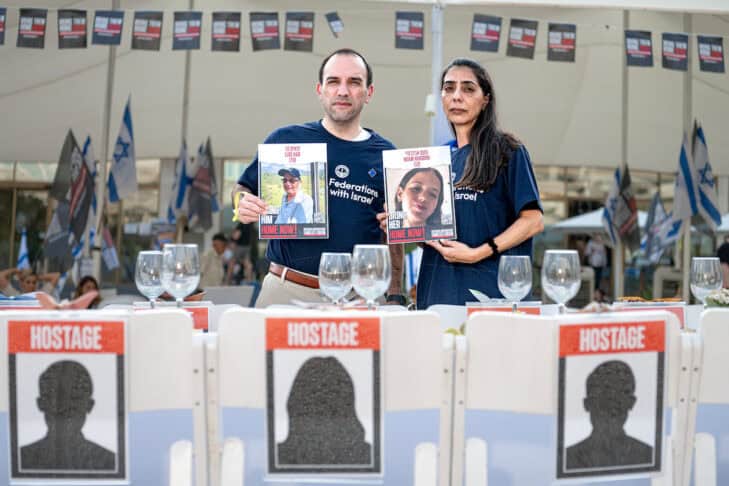During Passover, we always ask: “What makes this night different from all other nights?”
As we mark this time between the Passover holiday and Yom HaZikaron (Memorial Day) and Yom HaAtzma’ut (Independence Day), my thoughts lead me to the understanding that on “every other night,” we commemorate and learn from past events, but for over seven months now, we are living history.
These holidays now take on a different meaning, a vivid reminder of what our people have endured throughout millennia, all condensed into one intense period that feels almost biblical.
First and foremost, it’s essential to understand they’re interconnected: Memorial Day ends, and immediately, Independence Day celebrations begin. This closeness of the two reminds us to honor the memory of those who—through their sacrifice—secured our independence. We must live and thrive to honor their sacrifice.
Every year, this transition is difficult. But this year it will be harder and even impossible for many, including the families of the hostages. How can we celebrate independence when our people are held captive in subhuman conditions, clinging to shreds of hope to survive another day in captivity? Meanwhile, entire communities are still evacuated from their homes. Memorial Day will be a day of remembrance still being written and shaped, and our independence is in a deep crisis.
For us in Haifa and in the north of Israel, we’ve feared every morning and every night since Oct. 7 that the northern front might escalate, or perhaps the West Bank. For over half a year, we haven’t let children go anywhere alone, escorting them everywhere, not leaving the house or straying far from protected areas, ensuring the fridge is always full and there’s enough water and batteries. For over half a year, about 80,000 people from the north have been displaced, and entire settlements in the Gaza envelope haven’t returned yet while our hostages are in Hamas tunnels. The economy is rapidly declining, our international status is at an unprecedented low, and internal social disputes are resurfacing. For over half a year, everyone’s tense, on edge.
In addition to the warfare over Israel’s borders, the Jewish people are currently engaged in a struggle to protect their identity from adversaries who often fail to grasp the magnitude of injustice imposed upon us by the pro-Palestinian narrative to a global and brutal antisemitism. This conflict is not exclusive to Israel but encompasses Jews worldwide, and you, also, are on the front line in combating antisemitism.
Israelis are changing. We’re exhausted, in pain, lacking trust—but full of faith and motivation to give everything for the future we want to leave for our children. Everyone is doing something for the good of others and the future: assisting evacuees or reservists’ families, developing applications to deal with the challenges of the new reality (locating captives or managing volunteers), combating anti-Israel bias on social networks, and more. Gradually, a new leadership is emerging—among evacuees, soldiers, olim (immigrants), and volunteers. It’s a leadership connected to the people, to the land of Israel, and to the Jewish people, unafraid to recognize and confront the challenges of reality.
In the Bible, there’s the phrase, “Out of the strong came forth sweetness” (Shoftim/Book of Judges, chapter 14). The soldiers, who fought shoulder to shoulder on the battlefield, come from nearly all segments of Israeli society: religious and secular, right and left, Mizrahi and Ashkenazi, from the periphery, and the center of the country. They understand that we need each other, that our people are diverse, and that it’s vital to preserve the common cultural richness despite disagreements. The same happened with the volunteers, the innovators, and so on.
I’m witnessing the renewed connection between Israelis and Jews in Boston and around the world. The unprecedented involvement has helped Israelis understand that they are not alone in the battle and enhanced the ability of volunteers and civil society organizations to provide immediate responses to the many needs that arose.
Whenever a delegation from CJP arrived, I met colleagues whose eyes sparkled from just meeting the Boston community, filled with excitement, inspiration, and the strength to continue with all their might to build a better future. Thanks to CJP and other Jewish federations and Jewish Federations of North America, we managed to motivate the government to create significant projects and responses. The connection between Israeli citizens, civil society organizations, and Jews in the Diaspora allowed us to provide immediate responses to acute needs—such as the absorption of Kibbutz Manara residents in Kibbutz Gadot—an action that not only helps with temporary housing but also preserves the resilience, Jewish values, and cohesion of Israeli society. This is an extremely important role in influencing the construction of our shared future.
This Memorial Day and Independence Day will touch us all—even those who haven’t lost loved ones—and they will be painful days for our souls and hearts. Despite the dark times we’re living in, I remain optimistic. We must remember the wonderful and unique people we’re part of, who shine even in times of darkness. With such people, we cannot be defeated. Looking back at history, this strength has proven itself repeatedly.



